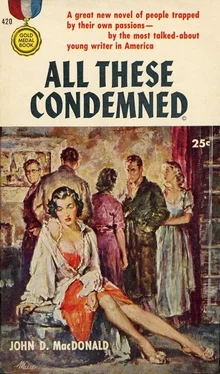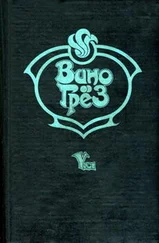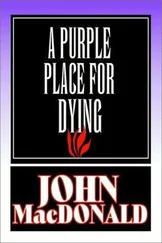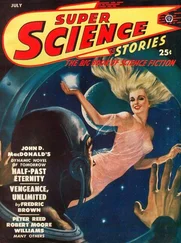He turned and walked away. He seemed to be spending the week end walking away from me. “A little too rough, honey,” I said to her.
“Was I? How can he afford self-righteousness? How—”
“Ssh, honey. Please.”
I gave her my hand and helped her out of the runabout. She came up onto the dock and leaned against me for a moment, light as a whisper. “I’m sorry,” she murmured. “I feel reckless, I guess.”
“Keep it bottled up. Just for a while.”
“Of course, darling. Anything you say. Anything.”
But I kept an eye on her. The night was warmer than any I had seen at the lake. We ate. The stars came out. We brought bottles and glasses and ice and mix down to the dock. The lake was black and laughter sounded good. Noel had acquired a little drunken giggle. Wilma was the one who suggested we kill the lights and do our swimming the way nature had perhaps intended we should. It seemed like one of the better ideas. Judy, Randy, and Wallace Dorn backed out. I went up to the box to turn off the lights. I turned them off. I waited a few moments and then turned them back again. There were yells of imitation anger. I put the lights off for good and felt my way back down. We were all there except Paul Dockerty. I found someone in the water. It was Mavis and she thought I was Gilman Hayes. We straightened that out quickly. I found Noel. We floated on our backs, holding hands, looking at the stars. She was fish-sleek in the water. All very gay. All very childish. Oh, we were delightful irresponsible people. There was some sort of disorganized game of tag for a time, with the rules getting continually more complicated. Randy, I think, was sulking. There was a bit of hysteria in Mavis’ laughter. I had the feeling that we were a pack of circus seals, performing for Wilma’s amusement.
I wondered why Gilman Hayes was calling Wilma so loudly.
Chapter Five
(Wallace Dorn — Afterward)
I was most definitely happy that I did not have to join that undignified scramble for clothing in the dark while Winsan ran to switch the lights back on. I heard their wet panting. And it alarmed me a bit to recall how close I had come to joining their little debauch. I had, indeed, been tempted for a few moments, thinking of the dark lake-wet flesh of women in the night. It is the mood of recklessness that Wilma knows how to develop, going at it quite coldly, for all the impression of warmth that she gives.
I wondered what Wilma had been thinking as the water had closed over her. Knowing her, I would judge that it had been a feeling of vast impatience, of plans interrupted. Not fear, I believe, because I feel that she, like a child, would be utterly incapable of objectively contemplating her own demise. She had a nice knack of making others die a little. Now she had died a lot. Thoroughly. And I found it quite pleasant to think about, actually. For me it was an extraordinarily convenient death. We had had our little chat. Death made her decision meaningless, as I had intended that, somehow, that decision should be made meaningless.
I felt as though now I could begin the process of recreating my own dignity. The years of Wilma had left me precious little. Nothing, perhaps, but the appearance without the substance. Now perhaps I could begin to feel that I could be free of all these other dreadful people. Free of Randy, that husk, that ethicless nothing. Free, of course, of Hayes, and of having to use his utterly talentless blobs in the Ferris program. Free of the Jonah woman, that crude, un-feminine clown. Through at last with Winsan, who is an almost obscene exaggeration of my own loss of self-respect. Of all of them, Paul Dockerty would be the one I would keep, out of necessity. And he is the best of the lot. Perhaps he is the best because, barring Gilman Hayes, he is the most recent. A few more years or perhaps a few more months would have given him over to Wilma in some devious way so that through her control she could despoil him.
I knew I would deal with Paul from now on, and sensed that he would retain our association. I had nothing to fear. I kept telling myself that. Nothing at all to fear.
It did not become quite horrible for me until they were all assembled and went back and forth in their boats, dragging for her body. I envisaged the cruel hooks seeking her flesh. I have always been too imaginative, I believe.
I could not watch it. I had been told by a uniformed and rather officious young man that I could not leave. I went to my room. I wished to ignore the whole episode. I donned my treasured flannel robe and sat in the deep chair in my room in darkness and smoked my pipe and tried to think of the work that would face me once I returned to my office. But all the time I was aware of them out there, with their lights and boats and hooks and their snickerings. I knew that it would be in the papers and that Mr. Howey would feel it necessary to call me in for one of his little chats.
I used to feel that he liked me. He does not seem to like me any more. He cannot claim that I do not do my work. It was, of course, Wilma Ferris who poisoned him about me. That is not fair. I did not seek out the Ferris account. What Mr. Howey does not seem to realize is that I can be most effective when I handle those accounts where business is conducted on the proper plane. You should be a gentleman in business relationships. Calmness and careful thought can be much more effective than all the self-conscious bustling about in the world. A good quiet lunch and a brandy and a discussion of business problems. I never asked for the Ferris account. I have never felt entirely competent to handle it because I was never able to talk properly to that damnable woman. She seemed to be forever laughing at me. And I do not consider myself to be a ludicrous man. I am educated. I am rather well set up. I have health and, I trust, a certain dignity.
I did not ask for the account, and had it not been given to me to handle, I should probably, even now, be on much better terms with Lucius Howey. It is quite clear to me that she poisoned him against me. Deliberately, maliciously.
I do not understand such people. One must have good will. At times, naturally, I have been forced to deal firmly with underlings in order to protect myself. But good will is my credo. If all my accounts were such reliable conservative old firms as Durbin Brothers, life could be very enjoyable. We agree on the media. I never attempt to force them to increase their total bill. We are in complete agreement on the dignity of the copy. And what finer program to support can there be? Their Citizens’ Forum improves the mind. The Durbin Brothers consider it a privilege to support the Forum. They are my idea of the business person who is aware of his obligations to the society in which he lives. True, it is a rather small account. But an excellent product. Excellent.
They would never be guilty of the sort of behavior that Wilma was guilty of that hideous day when I took the new copy to her apartment at her request. I had toned down some of the obvious floridities in it. And I had repaired some rather clumsy layouts. She was expressionless as she read the copy. I could not guess her reaction.
And then she had torn it all to bits and scattered them on the floor. I did not know her well. I made some sound of dismay.
She came over to me, her face contorted, and leaned so close to me that I leaned back in alarm. She called me Buster. She said, barely opening her mouth to say it, “Buster, you need some of the facts of life underlined for you, don’t you? That was supposed to be perfume copy. With that senile drivel you couldn’t sell sachet to your maiden aunt. All you got to do in that copy is to tell the girls that if they smell better they’ll be had more often.”
“Really, Miss Ferris!”
Читать дальше









![Джон Макдональд - Wine of the Dreamers [= Planet of the Dreamers]](/books/430039/dzhon-makdonald-wine-of-the-dreamers-planet-of-thumb.webp)


